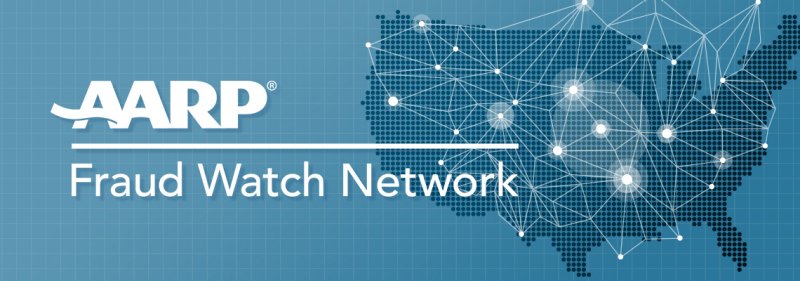Did you know that someone’s identity gets stolen every two seconds? The AARP Fraud Watch Network provides you with tips and resources to help you spot and avoid identity theft and fraud so you can protect yourself and your family. The watchdog alerts will keep you up to date on con artists’ latest tricks. It’s free of charge for everyone: AARP members, non-members, and people of all ages. If you can spot a scam, you can stop a scam. Report scams to local law enforcement. Contact the AARP Fraud Watch Network by visiting: www.aarp.org for more information on fraud prevention.
The AARP Fraud Watch Network receives real-time alerts about the latest scams, tips on how to spot them, and the inside scoop on how con artists think so you can outsmart them before they strike. The nationwide scam tracking map gives you access to a network of people who’ve spotted scams and the opportunity to pass along your own experiences, so together we can beat con artists at their own game. Get connected to a real live person trained in how to avoid fraud and advise you if you or a loved one has been scammed by calling our fraud hotline or attending a forum in your community. Free for Everyone. Anyone, of any age, can access the resources at no cost.
SCAM ALERT #1: RED FLAG WARNING: GIFT CARDS
A key part of being able to spot a scam is knowing the red flags – those signs that suggest that what you’re confronting may not be legitimate. One of the biggest red flags these days is anyone who tries to convince you that you owe some debt or other obligation, and the quickest way to address the issue is to purchase gift cards and share the information off the back.
Why gift cards? First, they are readily available. You see them at your grocery store, department store, and hardware store. Second, it’s a way that criminals can get your money instantly and the money is easy to move around. As soon as a target sends the numbers to the gift card they’ve purchased, the criminal is able to convert it to currency in an instant. Not surprisingly, the Federal Trade Commission reports that gift cards have been the most common form of payment in scams since 2018.
Anytime you are directed to pay a debt or other obligation with a gift card, it is a scam.
SCAM ALERT #2: AVOIDING IRS COLLECTION SCAMS
Tax time is here again and so are the IRS impostors! Scammers posing as IRS agents or Treasury Department officials are out there once again, calling to convince taxpayers that they owe back taxes and face immediate arrest. Know this: the IRS will initially contact you through the mail if you owe back taxes. If you receive an unexpected phone call, an email or a text indicating it’s from the IRS, do not engage. Report the scam attempt to the IRS at 800-366-4484 or visit: www.tigta.gov. If you receive an email, forward it to the IRS at phishing@irs.gov, and then delete it.
SCAM ALERT #3: SOCIAL SECURITY SCAMS
2020 was the year of new twists on scams. There were COVID testing scams, miracle cure scams, stimulus scams and vaccine scams, but one scam stood out above them all. The Social Security impostor scam.
Social Security impostor scams continue to be the most prevalent in the United States. In 2020, the Social Security Office of Inspector General received well over 700,000 reports of Social Security impostor scams, and 70% of the calls to the AARP Fraud Watch Network Helpline were related to Social Security impostors.
Remember, the real Social Security Administration will not call you unless you are already in discussions with the agency on a particular issue. They certainly won’t threaten to cut off your benefits or seek to “help” with an identity theft problem. Anyone who does is NOT from the Social Security Administration.
SCAM ALERT #4: “DO ME A FAVOR” CLERGY SCAMS
The ongoing remote world we’re living in has many of us getting used to doing more of our activities virtually. When we can’t be face to face, it makes for rich targets for adept scammers.
One trending scam is when a criminal impersonates clergy. The crook spoofs the e-mail address of a given faith leader and sends a message to a congregant requesting a favor. They will claim they are busy or out of town and just need you to purchase a dozen gift cards that will be used to help congregants in need. All you need to do is buy them (say, $100 each) and email a picture of the front and back of the cards. And of course, you will be reimbursed.
If you’re ever asked to do a favor like this, take a pause and think, “Would this person really ask me to do this?” Contact the person yourself and get validation they are who they say they are. And if the request was for gift cards, you’ll learn it was a scam attempt. If you can spot a scam, you can stop a scam. Report scams to local law enforcement. For help from AARP, call 1-877-908-3360 or visit the AARP Fraud Watch Network at www.aarp.org.




